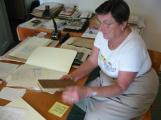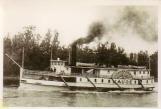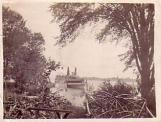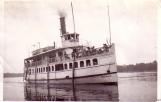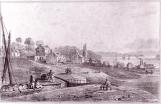2
About Phoebe:"My earliest memories were when I was a teenager in her plays, and I'm sure that was a lot of influence just learning all the Shakespeare which stood my in good stead in school because we didn't learn Shakespeare until later in school..."
"We took dramatic art lessons from her, where you had to say "how now brown cow" , and things like that, and I didn't like it, and my mother said I had to do it because she was a cousin. We really liked the plays, except to go to play practices in your summer holidays when you're 13, 14, 15 is nowadays asking a bit much, especially when it was Shakespeare, however it was very good for us."
"You just knew, almost automatically, how concerned and interested she was in the family, with Greenwood, and with Greenwood being a family museum, and she told me many, many times that all the things in Greenwood were being left as a family museum for the family. So she was terribly keen on having the family get involved. And in the later years when I used to go to the historical meetings with, and drive her different places and do things like that, I always had the feeling that she felt I was the one who was left, that maybe was going to do a little bit with the family, and with Greenwood. Because most people by that time had moved away, or they didn't have time."
"I think you get to know people by reading their letters, especially if you didn't know them before .... unfortunately there aren't a lot of letters of Phoebe's herself, there are a lot of letters to Phoebe, in fact there's like 2 or 3 thousand letters, not all to Phoebe of course, but a lot of them. The ones from Phoebe are very interesting because some of them are written when she was at school, some of them were written when she was studying in the Royal Academy in London, and some of them were written a little later, there are no later letters from Phoebe, I would say the 1930's are the end. There are a lot of letters to Phoebe, and particularly from her husband, Andrew. His letters of course answer her letters, so you know what she's written about."
"Very, very definitely an organizer, she could organize people, she was a great director of things, I always felt it was like she was directing a play, everybody would fall into place, and she knew exactly what everybody should be doing, and she certainly had a good way of telling them how to get on with it. She was a good director."
"She was terribly active in the Historical Society, and I think that for all that she might have been inclined to take it over, and even when she wasn't actually elected President she would take over the meetings to a great extent, and it would turn some people off, but I told more people than one in Hudson that if it hadn't been for Phoebe, the Historical society at one point would have collapsed. And now it survives and I think that a tremendous amount of credit goes to her. It was very important to her... it wouldn't have gone on, if she hadn't have made an effort, and sometimes it was an effort to get out to those meetings and to make sure that there were people who were interested to come, or interested to talk, and she was the one who got those books on the early settlers organized, she did the phoning and she did the talking and she did the talking into... she got a lot of those done, and they wouldn't have been done if it hadn't been for her."
"She was very involved with the church, she was very interested in the church... partly because our ancestors had built the church... so the family had always been involved and there are a lot of family plaques in the church, and she always made sure they were in good shape."
"She was also in charge of the Chancel Guild for years and years and years, she was the one that got the flowers for Sundays arranged, so that now everybody knows the rules about how to do the flowers on Sunday, because Phoebe did that... She was in church every Sunday and sometimes early Communion..."
"She wanted everybody to have dramatic art lessons, and at one point in time, the minister made a sort of list of who was to read every Sunday, so it was a different person, and I hated it because I hated getting up and reading anything. At one point she was very upset after everybody had done all this, for quite a long time, she mentioned to me, and I guess to others, that she didn't like the way it
was read, it was not in the least bit dramatic and wasn't done well at all. She was going to have lessons for everybody, but at that time the whole routine changed for some reason, and different people were not getting up to read. But when Phoebe got up to read, boy you could tell she had dramatic art lessons!!!...."
"That was Phoebe... you expected her to be dramatic. She was dramatic when she was telling you a story at the dinner table, I mean Phoebe was on the stage a lot of her natural life."
"They were a lot about women in history in Quebec. She was terribly interested in Quebec history she was terribly interested in women in history."
"The ones that I remember... from Shakespeare which she did right after the war, actually during the war when she couldn't go to England. She would go around to the high schools and do scenes from the plays that the grade 11's were studying that year, like Hamlet and MacBeth... l think the first school she ever went to was Hudson High, which is here, then she came to St.Lambert because our family was living there so she had an in... then she began to travel further and further afield so that she was going to Ontario, New Brunswick and so on, and she was absolutely marvellous. She would do scenes form MacBeth, so she would be first of all the three witches, then she would be Lady MacBeth, then she'd be somebody else, and it was always with just the change of a hat, or a cloak or just turning around on the stage. She never left the stage, she didn't really change costumes or anything, and she was really very good. I think although a lot of students in gr.10 and 11 didn't really like Shakespeare, it was really their first chance seeing it on stage, because normally you're just reading it out of a book."
"She had a tremendously wide interest, and it wasn't superficial. When she got interested in something, she studied it, she read up on it, she worked at it, she talked about it with people. And her notebooks are just full of things that she was interested in, and took notes on, and looked up, and did research on."
"She would read up a play before she went to see it, she would write up about the play after she had gone to see it, and do a critique of it, or she would just plain take notes on whatever the characters were involved in the play and what she knew about them... she did that a lot."
"And then she became interested in Indians out in the West, and spent a lot of time with the Indians on the West coast, and there are a lot of notebooks about that, and a lot of talking to the Chiefs out there, and getting their legends, and writing them down... and she used to have Indian groups from Oka, and had big sort of Sunday afternoon parties and have somebody usually as a speaker... "
4
" To get to the Ottawa River from the St.Lawrence you had to go through the white-water either at Ste. Anne's or Vaudreuil and one of the rival companies had built a lock at Ste. Anne's, and they were the only ones who were allowed to use it, so when he brought his barges down with the St. David because these were all tow-boats, they would go down the rapids at Ste. Anne's. That summer the water was so low that they couldn't get down the rapids at Ste. Anne's and he decided that they would go over to Vaudreuil. If you go down there today you can see under the bridge there, there's a little island....one of the crew got into the water and they made soundings all the way down through the rapids... and put markers and put buoys out, and found that there was just enough, they only needed about three feet of water, they were very shallow draft. So at that point of course all the barges, not just his company's barges, but all the barges who weren't from this rival company could go down without worrying about the locks at Ste. Anne's. If they'd been stuck up here, all their goods would have been a little late getting to the market in Montreal.""So the owners of the St. David were so impressed with this feat that they gave him the command of their larger steamer the next summer, which was much more comfortable, the "Oldfield", and so he was on the "Oldfield" for a couple of seasons... the owners decided to move their business over to the St.Lawrence River, and he wanted to stay on the Ottawa River, partly because he knew it, and partly because he had met Mary Cecilia Delesderniers who lived at "Greenwood", and it was much more convenient to visit her if he was sailing up and down the Ottawa River and so they said if he could find people to invest, he could buy the "Oldfield" and start his own company, and that's how the Ottawa River Navigation Company got started...."
